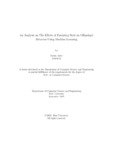| dc.contributor.advisor | Mostakim, Moin | |
| dc.contributor.advisor | Reza, MD Tanzim | |
| dc.contributor.author | Akter, Nasrin | |
| dc.date.accessioned | 2023-10-12T04:17:03Z | |
| dc.date.available | 2023-10-12T04:17:03Z | |
| dc.date.copyright | ©2022 | |
| dc.date.issued | 2022-12-04 | |
| dc.identifier.other | ID 18301252 | |
| dc.identifier.uri | http://hdl.handle.net/10361/21780 | |
| dc.description | This thesis is submitted in partial fulfillment of the requirements for the degree of Bachelor of Science in Computer Science and Engineering, 2022. | en_US |
| dc.description | Cataloged from PDF version of thesis. | |
| dc.description | Includes bibliographical references (pages 44-45). | |
| dc.description.abstract | Parents are usually the most important person for a human being as they encourage
and support an offspring’s physical, emotional, social, and intellectual development
from infancy to maturity. An individual faces various challenges as they grow up.
Proper parenting plays a prominent role in handling and abating those challenges.
This paper aims to show various consequences on the attachment style and handling
of depression, anxiety, stress, anger due to different types of parenting style. These
consequences of parenting styles are to be figured out in an automated way so
that one can acknowledge these factors on their own and bring various positive
changes to their parenting. The term ”parenting style” refers to a collection of
tactics that have various effects on children. These methods can have an impact
on children’ minds that lasts long into adulthood, both positively and negatively.
This research makes use of machine learning algorithms in order to differentiate
between various parenting styles through various aspects of their life such as stress,
anxiety, depression, attachment style, anger management etc. The lack of publicly
accessible data prompted us to compile my own data set, which consisted of 2206
survey responses from students(school, college, university). Afterward, the survey
data was stored and pre-processed. Then, machine learning algorithms such as
Decision Tree, XG-BOOST, KNN, Support Vector Machine and Random Forest
are utilized to detect parenting style by analyzing the effects of parenting on their
offspring and the accuracy of these models are 84.70%, 76.71%, 87.30%, 87.30% and
85.185% sequentially. | en_US |
| dc.description.statementofresponsibility | Nasrin Akter | |
| dc.format.extent | 45 pages | |
| dc.language.iso | en | en_US |
| dc.publisher | Brac University | en_US |
| dc.rights | Brac University theses are protected by copyright. They may be viewed from this source for any purpose, but reproduction or distribution in any format is prohibited without written permission. | |
| dc.subject | Parenting style | en_US |
| dc.subject | Attachment style | en_US |
| dc.subject | Stress handling | en_US |
| dc.subject | Anger management | en_US |
| dc.subject | Depression | en_US |
| dc.subject | Anxiety | en_US |
| dc.subject | SVM | en_US |
| dc.subject | KNN | en_US |
| dc.subject | RF | en_US |
| dc.subject | Decision tree | en_US |
| dc.subject | XGBoost | en_US |
| dc.subject.lcsh | Interpersonal relations | |
| dc.subject.lcsh | Computer programming | |
| dc.title | An analysis on the effects of parenting style on offspring’s behavior using machine learning | en_US |
| dc.type | Thesis | en_US |
| dc.contributor.department | Department of Computer Science and Engineering, Brac University | |
| dc.description.degree | B.Sc. in Computer Science | |

